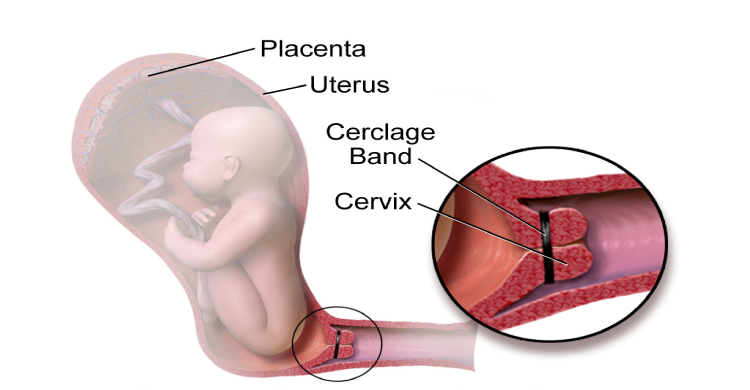Cervix Cerclage
What is Cervix Cerclage?
Your doctor will sew your Cervix closed during a cervical cerclage operation, also known as a cervical stitch, which is performed before or during pregnancy. During childbirth, the cervix, a funnel-shaped piece of tissue, opens to allow the baby to pass through the vagina and exit the uterus. Your doctor could advise a cervical cerclage if your cervix has become fragile. This is done to keep your foetus safe while it is still within your womb, waiting for the right moment to give birth.

Why is a Cervix Cerclage performed?
The cervix begins to dilate, or expand, as your body prepares to give birth. However, it might open too quickly if your cervix is fragile or suffers from other issues. This may result in an early birth or miscarriage. A cervix cerclage is performed when your cervix might be incompetent, weak or in case of past miscarriages. So, it’s important to discuss any previous pregnancies, miscarriages, and treatments you’ve had with your doctor or nurse.
When is a Cervix Cerclage done?
It is recommended to have a Cervical Cerclage 12 to 14 weeks into your pregnancy if your doctor advises it. After this period, the surgery is known as an emergent cerclage. You are more likely to require another urgent cerclage if you become pregnant again if you’ve already had one. Otherwise, you have up to 24 weeks to have the procedure. After that time, a cervical stitch might rupture the amniotic sac and hasten the delivery of your child.
How to be prepared for Cervix Cerclage?
There are a few preparations you must do before your Cerclage Surgery.
- An analysis of your medical background.
- To assess the health and development of your unborn child, your doctor could request an ultrasound imaging of your womb.
- To check for infection, your doctor may swab your cervical mucus or gently insert a needle into your uterus from your abdomen to collect an amniotic fluid sample (amniocentesis).
- You could require antibiotics if you have an infection. If at all feasible, you should complete the therapy before getting your cervical stitch.
How is a Cervix Cerclage performed?
A cervix cerclage is performed in the following order:
- Like when you get a vaginal exam, you will lie on an exam table with your legs spread and both of your feet in stirrups.
- A local anaesthetic or other painkiller will be administered by your anaesthesiologist, so you won't experience any discomfort or agony throughout the treatment. When the needle is put into your cervix to numb it, you could feel a slight squeeze.
- Your doctor will stitch your cervix closed with strong sutures once the anaesthetic takes effect, tightening it until it is secure.
What happens after a Cervix Cerclage?
You’ll spend a few hours in your doctor’s office or the hospital following your surgery to ensure there are no issues. You’ll be allowed to return home that day.To help you avoid any cervical infections, your doctor may prescribe an antibiotic. The day of your procedure, you should schedule a day of relaxation. Your doctor will advise you to wait at least 10 days after your sutures are removed before engaging in any vigorous activity or sexual activity. It’s crucial to adhere to your doctor’s aftercare recommendations and keep all scheduled follow-up appointments so they can keep track of your pregnancy.
Consulting hospital
Women's Care Clinic
- C/O Dr. Sonal Bhangale, SHOP NO 512, OPD 209, plot no 47, D Mart Rd, Sector 15, Kharghar, Navi Mumbai, Maharashtra 410210
Alpha One Hospital
- Alphaone Hospital, Kharghar 410210.
